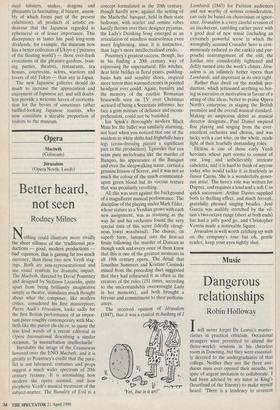Opera
Macbeth (Coliseum) Jerusalem (Opera North, Leeds)
Better heard, not seen
Rodney Milnes
Nothing could illustrate more vividly the sheer silliness of the 'traditional pro- ductions — good, modern productions — bad' equation, that is gaining far too much currency, than these two new Verdi stag- ings. Both are non-representational and use visual symbols for dramatic impact. The Macbeth, directed by David Pountney and designed by Stefanos Lazaridis, quite apart from being brilliantly imaginative simply as theatre, stimulates much thought about what the composer, like modern critics, considered his first masterpiece; Pierre Audi's Jerusalem, looks sadly for the first British performance of an impor- tant piece roughly contemporary with Mac- beth like the purest chi-chi or, to quote the less kind words of a recent editorial in Opera International describing a similar occasion, 'la masturbation intellectuelle'.
Inevitably the image of the Ceausescus hovered over the ENO Macbeth, and it is greatly to Pountney's credit that the para- llel is not laboured: costumes and props suggest a much wider spectrum of 20th century tyranny. It is astonishing how modern the opera seemed, and how prophetic Verdi's musical treatment of the subject-matter. The Banality of Evil is a concept formulated in the 20th century, though hardly new; against the setting of the Macbeths' banquet, held in their state bedroom, with scarlet and ermine robes hastily thrown over their designer pyjamas, the Lady's Drinking Song emerged as an articulation of mindless malevolence even more frightening, since it is instinctive, than Iago's more intellectualised credo.
Pountney's greatest success, though, lies in his finding a 20th century way of expressing the supernatural. His witches, dear little biddies in floral prints, pudding- basin hats and sensible shoes, inspired more terror than wizened crones in pointed headgear ever could. Again, banality and the memory of the couthie Romanian housewife seen on TV over Christmas accused of being a Securitate informer, her face a grim mixture of defiance and incom- prehension, could not be banished.
Ian Spink's thoroughly modern Black Mass for the ballet was similarly alarming, not least when you noticed that one of the maidens in white shifts had frightfully hairy legs (cross-dressing played a significant part in the production). Episodes that can seem pure melodrama like the murder of Banquo, his appearance at the Banquet and even the sleepwalking scene, carried a genuine frisson of horror, and it was not so much the colour of the much commented- upon green blood but its viscous texture that was peculiarly revolting.
All this was seen against the background of a magnificent musical performance. The discipline of the playing under Mark Elder, whose stature as a Verdian grows with each new assignment, was as stunning as the way he and his orchestra found the very special tinta of this score (ideally oleagi- nous lower woodwind). The chorus, on superb form, lammed into the first-act finale following the murder of Duncan as though each and every once of them knew that this is one of the greatest moments in all 19th century opera. The detail that Jonathan Summers and Kristine Ciesinski mined from the preceding duet suggested that they had rehearsed it as often as the creators of the roles (151 times, according to the understandably overwrought Lady in her memoirs), and both brought a fervour and commitment to their perform- ances.
The received opinion of Jerusalem (1847), that it was a cynical re-hashing of I 'Yes, but is it art?' Lombardi (1843) for Parisian audiences and not worthy of serious consideration, can only be based on chauvinism or ignor- ance. Jerusalem is a very careful revision of an incoherent, rambling earlier piece with a good deal of new music (including an extremely powerful scene in which the wrongfully accused Crusader hero is cere- moniously reduced to the ranks) and pur- poseful rearrangement of the old; the Jordan trio considerably tightened and deftly turned into the work's climax. Jeru- salem is an infinitely better opera than Lombardi, and important in its own right.
Rather than dwell on the modish pro- duction, which jettisoned anything so bor- ing as narrative or motivation in favour of a string of chic ideas, better to praise Opera North's enterprise in staging the British premiere and the overall musical standard. Making an auspicious debut as musical director designate, Paul Daniel inspired fine playing and singing from the ever- excellent orchestra and chorus, and was lucky with a cast who, on the whole, made light of their fearfully demanding roles.
Helene is one of those early Verdi heroines whose part seems to consist of one long and unbelievably intricate cabeletta, and it is hard to think of anyone today who would tackle it as fearlessly as Janice Cairns. She is a wonderfully gener- ous artist. The hero's role was written for Duprez, and requires a loud and a soft C in quick succession: Arthur Davies supplied both to thrilling effect, and much fervent, gratefully phrased singing besides. Jose Garcia was audibly stretched by the vil- lain's two-octave range (short at both ends) but had a jolly good go, and Christopher Ventris made a noticeable Squire.
Jerusalem is well worth catching up with on the company's tour but oh, gentle reader, keep your eyes tightly shut.


















































 Previous page
Previous page